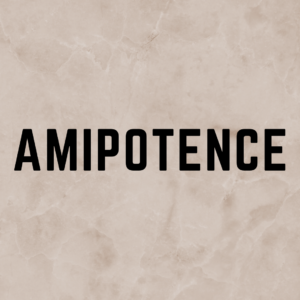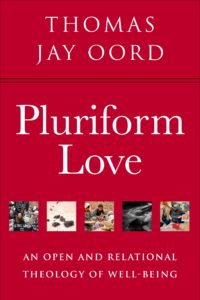Amipotence
I’m working on the final chapter of a new book called, The Death of Omnipotence… and Birth of Amipotence. In previous blogs, I’ve identified reasons we should stop saying God is omnipotent. The final chapter in this new book explains the word “amipotence.”
Amipotence combines two Latin words ami and potens. The first means “love,” and we find it in words like “amicable,” “amity,” and “amigo.” The second is the Latin word for power or influence, and we find it in “potential” and “potency.” Amipotence is pronounced, “am” (as in “Amsterdam”), with a short “i” (as in “it”), and “po-tence” (similar to “moments”).
Am-i-po-tence.
I coined this word to stress the priority of love over power in God.[1] Divine love (ami) comes logically and conceptually prior to divine power (potens). We best understand God in general and divine power in particular if we give love pride of place. Love comes first.
Amipotence interprets the Johannine phrase “God is love” (1 Jn. 4:8,16) to mean love comes first in God. God is necessarily loving, because it’s God’s eternal and unchanging nature to love. God could no more stop loving than stop existing; but both are metaphysical impossibilities. Amipotence agrees with John Wesley when he says, “God is often styled holy, righteous, wise… [but] he is said to be love: intimating that this is . . . his reigning attribute, the attribute that sheds an amiable glory on all his other perfections.”[2]
What is Love?
Crucial to making sense of amipotence is making sense of love. Most theologians say God loves, and some say divine love is powerful. But few define love carefully or allow love to characterize divine power in a satisfactory way. As a result, the majority portray God’s love in ways that differ radically from what we consider love.
Love as we know it involves giving and receiving relationships, for instance. But theologians like Augustine and David Bentley Hart say God’s love is nonrelational or impassible. Love as we know it is expressed moment by moment. But theologians like Thomas Aquinas and Paul Helm say God’s love is timeless. While our love often if not always includes emotion, theologians like Anselm and James Dolezal say divine love includes no emotional response to creatures. And although love prevents evil that is preventable, theologians like Jacob Arminius and Jack Cotrell say a loving God allows hurts, horrors, and holocausts.
We best define the love in amipotence as acting intentionally, in relational response to God and others, to promote overall well-being. This definition applies to both divine and creaturely love. The love God and creatures express, in other words, involves intentional action, relations with others, and the aim to promote flourishing.[3] And because love is inherently uncontrolling, neither divine nor creaturely love controls.
Love can’t be omnipotent.
While the definition of love applies to God and creatures, divine love is greater in degree than creaturely love. Divine love is universal and therefore differs in scope, because only God is omnipresent. God’s love differs in duration and frequency, because God loves everlastingly. Divine love differs in adequacy, because God is omniscient and therefore better knows what promotes well-being. Divine love is necessary, because it’s God’s nature to love; creatures may or may not love. Divine love is perfectly sensitive and vulnerable, because God is affected by all creation. Creatures often fail to empathize with a few, let alone be sensitive to all.
What is Divine Power?
The “potence” of amipotence pertains to God’s influence. Divine power is immensely more influential than creaturely power. God is more powerful, in part, because God affects all creation. And divine love is more powerful because everlastingly relentless. The power of amipotence is active and receptive, empowering and empathetic, wooing but persistent, and always uncontrolling. God’s love is literally the most powerful force in the universe.
An amipotent God is not omnipotent in the sense of having all power. It is impossible for a loving God to have all power, because love requires responsive others with power. An amipotent God is not omnipotent in the sense of being able to do absolutely anything. After all, love cannot sin, cannot force its own way, cannot be isolated, cannot make 2 + 2 = 7, and more. And an amipotent God does not control creatures or circumstances, because love is inherently uncontrolling.
God exerts the greatest conceivable power but, thank goodness, is not omnipotent. Amipotence is maximal divine power in the service of love.
[1] Bradford McCall argues for something similar with “amorepotent.” See The God of Chance & Purpose: Divine Involvement in a Secular Evolutionary World (Eugene, Or.: Wipf & Stock, 2021).
[2] John Wesley, Explanatory Notes on the New Testament (New York: Lanes and Scott, 1850), 1 John 4:8.
[3] I explain this definition in detail in Defining Love: A Philosophical, Scientific, and Theological Engagement (Grand Rapids, Mich.: Brazos, 2010), chs. 1-2 and Pluriform Love , ch. 2.



Comments
I love it! Amipotence is a beautiful way to express that God’s love takes precedence over God’s power, and gives us a new way to look at the topic of theodicy.
Thanks for the encouragement, Kenneth!